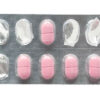For Kevin, a bright, sociable 8th-grader with ADHD, the first week of school was rough. After stopping Adderall over the summer, he restarted it, knowing it helped him stay focused at school. But for the first few days he had trouble falling asleep — a common result when resuming stimulants. It also didn’t help, says his mom ruefully, that “we had run out of melatonin.” Neither did the switch from a late-rising summer sleep schedule nor his tendency to be a night owl, anyway.
Predictably, Kevin’s appetite for lunch waned — another side effect: “This is always an issue. I pack a great lunch and he never eats it.” (Except for the chips!) Since he forgot to take his Adderall over the weekend, 2 hours of homework turned into 4. “Homework, no matter what, has been an issue, even though he has been much better in the past few years about doing it,” she says. She’s sorry to see summer end. “I hate the start of the struggles again.”
The hallmarks of ADHD — inattentiveness, impulsivity and hyperactivity — can make school especially demanding for families whose children have this common neurobehavioral condition. For them, the new school year ushers in a wide array of challenges, from figuring out the right dose of medication to exactly what is the next day’s homework assignment. ADHD children who struggle at school tend to do better when parents are organized, patient and encouraging.
ADHD affects a substantial number of school age children. By 2011, more than 1 out of 10 children (11% or 6.4 million) had ever received such a diagnosis, according to a survey of parents by the federal Centers for Disease Control and Prevention. And that population is growing. A similar survey in 2007 identified 9.5% of children as receiving the same diagnosis.
More recent findings show the disorder continues to be more diagnosed among boys (14.1%) than girls (6.2%).
The numbers of children taking ADHD medication also rose from 4.8% in 2007 to 6.1% in 2011. Popular stimulants like Ritalin or Adderall improve symptoms but also come with side effects, most notably troubles with appetite, sleep, nervousness, and increased heart rate and body temperature.
Browse This Article
 Adjusting Medication Dosages for ADHD
Adjusting Medication Dosages for ADHD
For children like Kevin who take medication vacations, experts say they typically can resume stimulants at the same dose. The most conservative approach is to titrate the stimulant for the first 2 or three days, giving a half dose on the first day, a full dose on the second day, says Andrew Adesman, MD, Chief, Developmental & Behavioral Pediatrics at the Steven & Alexandra Cohen Children’s Medical Center of New York.
“Is it essential? No. Is it FDA stipulated? Not really.” Still, he says, “Most kids will adjust ultimately. It’s just a matter of whether they have a few side effects on the first day or 2 of resuming the medicine.” Not all stimulants can be titrated easily. Concerta, for example, comes in a caplet form that can’t be cut without compromising its delivery system, notes Dr. Adesman, pointing to an ADHD medications guide (pdf) he developed, which is now published by the Cohen Children’s Medical Center at Northwell Health.
But non-stimulant medications such as Intuniv and Kapvay must be resumed gradually, with children starting on a low dose for about a week, before incrementally moving up to the desired dose, says Dr. Adesman. Similarly, Strattera, should be taken at a low dose for about 4 days, and then increased. Depending on the medication, full benefits may not be realized from about 1 to 8 weeks after the medicine is first taken.
If a child is on ADHD medications, parents should alert teachers, says Glen R. Elliott, MD, Chief Psychiatrist and Medical Director of the Children’s Health Council in Palo Alto, Calif. After a summer off, it may take time to hit the right dose. For example, a student entering puberty may have outgrown his or her dose. Inadequate medication may cause friction in the classroom. If teachers are in the know, they tend to be more understanding, especially if they see “parents are on board” with them in addressing the situation, adds Dr. Elliott.
 Helping Your ADHD Child Get Organized
Helping Your ADHD Child Get Organized
Students with ADHD typically have problems with organization—an issue when it comes to homework.
Last year, Kevin lost 3 agenda books, multiple assignments and a major research paper the weekend before it was due. “When he lost that whole project, I was very discouraged,” says his Mom, whose weekend plans dissolved into supervising Kevin’s re-creation of the project. (To their happy surprise, though, Kevin’s teacher said his paper was the best in his class.)
Kevin’s problems resonate with many ADHD families facing a new school year. To them ADHD is as much about lost homework instructions, incomplete assignments and misplaced textbooks as it is about problems paying attention or sitting still.
Experts say there are ways to help children become better organized.
 Mastering Homework
Mastering Homework
Homework is a complex process. It involves hearing the assignment, accurately recording it, having appropriate materials, allotting adequate time, actually doing it and then getting it safely to the teacher.
Not surprisingly, homework is a challenge for those with ADHD.
Indeed, homework is now a primary focus for Joshua M. Langberg, PhD, Co-Director of the Virginia Center for ADHD Research, Education and Service at Virginia Commonwealth University and author of “Improving Children’s Homework, Organization and Planning Skills.” In a recent CHADD Webinar on the topic, Dr. Langberg says that “some of our work shows that ADHD kids complete 10 to 15% fewer assignments than their peers over each semester.”
And learning how to successfully manage homework in the early years may be more important than we realize. Case in point: Dr. Langberg points to research that shows parents’ ratings of their kids’ ability to manage homework materials in the early grades predict their GPA in high school — above and beyond other important factors.
In the CHADD Webinar, Dr. Langberg gives practical advice on how to help students tackle homework. Here’s a Sparks Notes version of some key tips:
- Pick one behavior related to homework– say, recording assignments in a planner on a daily basis. Define exactly what you want your child to do. One example: Fill in the assignment block for each subject in the planner every day (even if there’s no homework!).
- Figure out who will monitor that behavior and how often (daily is best).
- Use rewards to reinforce success with this new behavior. This helps the child to associate positive feelings with this behavior.
- Give rewards immediately. ADHD students work better with the here-and-now rather than the future. Consider: If you finish your math worksheets before dinner, you can play video games for an hour versus If you read 1 chapter in science today, you may earn a better grade in science on your report card.
- Be positive. Based on past, not-so-good experiences, students with ADHD are likely to approach any new homework system with pessimism.
- Be patient. Work on only >one behavior at a time. Trying to do too much at once raises the risk for failure.
More advice from Dr. Langberg can be found in his webinar, available on YouTube.
 Getting It Done
Getting It Done
For some children, the hardest part about homework is sitting down and doing it. For starters, stock a clear container with homework essentials — calculator, scissors, index cards and so on. “You don’t want to spend 20 minutes of precious homework time looking for supplies,” says Leslie Josel, an organizational specialist with an expertise in ADHD and founder of Order Out of Chaos, Josel. “It’s hard to get them to sit down again and focus.”
Josel and other pros say asking children what homework time is best and where they want to tackle it improves the odds that it will be done. With younger ones, making it fun also helps. Organizer Josel suggests a game called “Hide the Homework,” in which students have to find the math or vocab sheet and then complete it in that spot — even if it’s in the bathtub. Humor also can work with older kids.
More on Rewards
As Dr. Langberg points out rewards work well in the ADHD community — and just about everywhere else. (At work, we adults get raises, bonuses, shout-outs from the boss, and so on.) Most kids with ADHD, says Elaine Taylor-Klaus, a parenting coach for ADHD families, “don’t have a ‘just get it done button.’ They really do need to find something that makes it interesting or exciting or intriguing.” Ask your child what incentives would motivate them, says Taylor-Klaus. “Often times, it is way simpler than we realize.”
Case in point: a night of bowling in return for several nights of completed homework assignments.
Praise, even for a small success, can have a big effect on students not likely to hear a ton of plaudits at school. One example: “You set a timer (for your homework), and I am so proud of you.”
For middle-school students — an admittedly tougher group — their need to socialize and use electronic devices to communicate – offer lots of opportunities for incentives. “As soon as you finish your homework, you can use your laptop.”
 Managing Time Successfully in Children with ADHD
Managing Time Successfully in Children with ADHD
Estimating how long it will take to do homework or get ready for school can be challenging for children with ADHD. Experts advise asking children to write down their time estimate for each task and then do a reality check. Using an old-fashioned clock with a sweep hand also helps. “It shows time moving,” notes Josel.
Another strategy? Allow children breaks between assignments, say experts. Skateboarding in the driveway or eating a healthy snack can help a child expend some energy, refuel and regain focus.
Students also may benefit from a homework play list on their iPod or phone. “Music is rhythm and rhythm is structure. They hear that music and start to get homework done,” says Josel. By the time they hear Bruno Mars, they know they’ve completed 30 minutes worth of homework.
 Be Compassionate
Be Compassionate
Most of all, say the experts, try to imagine the child’s day at school. “Be compassionate for their experience because it is hard,” says Taylor-Klaus. “In the beginning of the school year, kids work really hard to keep it together all day,” so they need the chance to decompress at home and feel supported and encouraged by the people who love them most.
Originally published Sept 18, 2013 and updated August 17, 2016.






